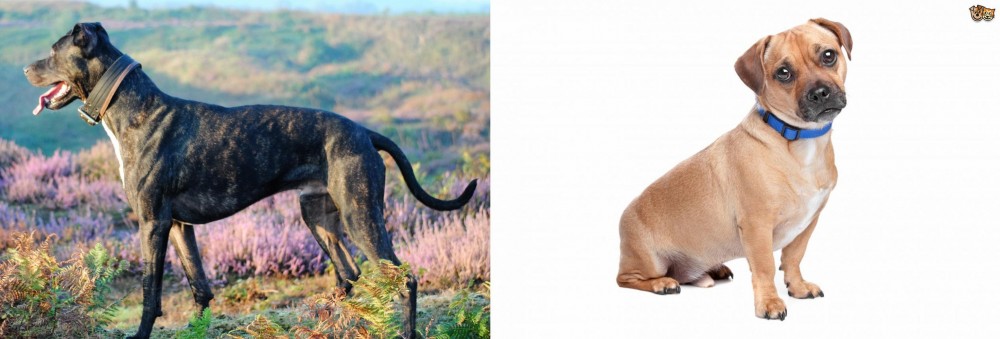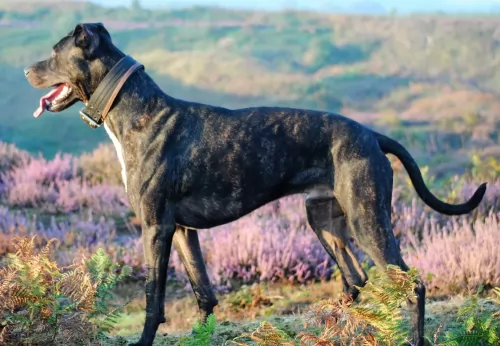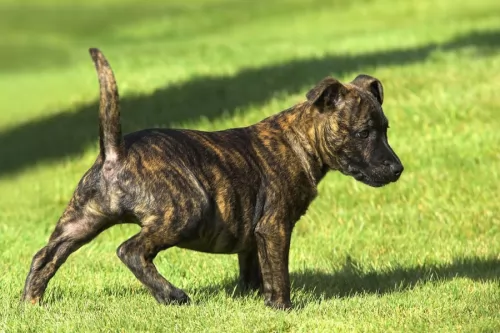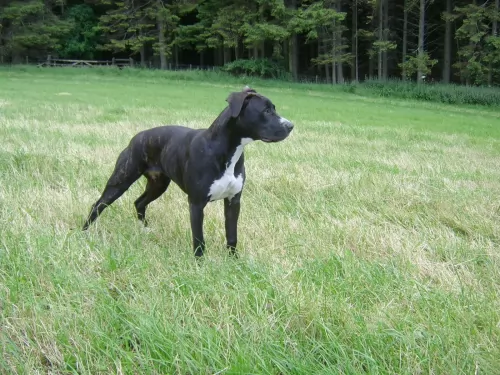 Petzlover
Petzlover Alaunt is originated from Afghanistan but Jug is originated from United Kingdom. Alaunt may grow 49 cm / 20 inches higher than Jug. Alaunt may weigh 61 kg / 135 pounds more than Jug. Alaunt may live 5 years less than Jug. Alaunt may have more litter size than Jug. Both Alaunt and Jug requires Low Maintenance.
Alaunt is originated from Afghanistan but Jug is originated from United Kingdom. Alaunt may grow 49 cm / 20 inches higher than Jug. Alaunt may weigh 61 kg / 135 pounds more than Jug. Alaunt may live 5 years less than Jug. Alaunt may have more litter size than Jug. Both Alaunt and Jug requires Low Maintenance.
 Alaunt is an extinct breed that existed 3000 years ago since 300 years ago. They were very popular dogs and people used them for many different tasks. They were a perfect working dog, but also they were used for wars and many other situations. Since the migrating was very common through the history, there were many different Alaunt breeds all over the Europe and Asia. Alaunt originated from central Asia, probably Afghanistan.
Alaunt is an extinct breed that existed 3000 years ago since 300 years ago. They were very popular dogs and people used them for many different tasks. They were a perfect working dog, but also they were used for wars and many other situations. Since the migrating was very common through the history, there were many different Alaunt breeds all over the Europe and Asia. Alaunt originated from central Asia, probably Afghanistan.
 The Jug is a crossbreed – a mix of a pug and a Jack Russell Terrier and they were bred in England with the idea to keep the basic features of a pug but just with a longer nose.
The Jug is a crossbreed – a mix of a pug and a Jack Russell Terrier and they were bred in England with the idea to keep the basic features of a pug but just with a longer nose.
Details on the origin of the dog are not altogether clear but the dog was developed so that it would reduce the breathing problems that pugs and other flat-faced breeds are known for.
This isn’t an old breed and development started around the 1960s. It is one of the most recent breeds to be registered by the American Canine Hybrid Club.
 Weight of the Alaunt variates and it depended from dog to dog. The average weight of this breed was 20-68kg. While their height was 56-85cm. Females were slightly smaller with an average weight of 16-60kg, with a height of 50-80cm.
Weight of the Alaunt variates and it depended from dog to dog. The average weight of this breed was 20-68kg. While their height was 56-85cm. Females were slightly smaller with an average weight of 16-60kg, with a height of 50-80cm.
A lifespan of Alaunt was 10-12 years. Litter Size of an average Alaunt was 6-10 puppies.
Other Names for Alaunt are White Kazbegi, White Balkan dogs, Alaunt Gentil, Alaunt de Boucherie, Boucherie
 The Jug will usually end up having a round head with the typical short muzzle of the Pug. He may be somewhat lighter in build than the Pug, taking more after the Jack Russell in this regard.
The Jug will usually end up having a round head with the typical short muzzle of the Pug. He may be somewhat lighter in build than the Pug, taking more after the Jack Russell in this regard.
The way the dog turns out will depend on which dog the puppy takes after. He is a small breed dog standing at between 25 to 36cm at the withers and weighing 5 to 7kg.
When it comes to coat color you'll find they can vary between fawn, black, apricot and sometimes a blend of two colors. While pugs come with smoothish coats, the Jack Russell can either have a smooth or rough coat and your Jug could inherit either a smooth or rough coat.
He could inherit the Pug’s flat, somewhat wrinkled face while others may have a slightly longer muzzle. The eyes are large and the ears are floppy. The legs are short and the tail will no doubt be left long these days and be slightly curled.
The tenacious, fearless, intelligent nature of the Jack Russell Terrier mixed with the entertaining, amicable nature of the pug has brought out the Jug dog with a whole lot of excellent qualities of both dog breeds.
They are loving, loyal dogs and when they are trained and socialized they get on particularly well with both pets and children in the the home. He is intelligent and will be able to learn some simple commands such as sit, stay and lie down.
 This breed was very powerful. They could adjust to any climate without any problems. Alaunt needed a lot of exercises because they were very strong and active dogs. They were also very intelligent dogs who knew what it wanted. People loved this breed because they were very smart, but also the perfect companion in every situation. Very protective but kind breed was loved in many countries.
This breed was very powerful. They could adjust to any climate without any problems. Alaunt needed a lot of exercises because they were very strong and active dogs. They were also very intelligent dogs who knew what it wanted. People loved this breed because they were very smart, but also the perfect companion in every situation. Very protective but kind breed was loved in many countries.
 Jugs are wonderful little dogs and they make a good choice for first time dog owners as they don’t come with any difficult characteristics.
Jugs are wonderful little dogs and they make a good choice for first time dog owners as they don’t come with any difficult characteristics.
They’re playful, intelligent, energetic and amicable and just love to please their human family. Because of his small size, he is also an adaptable dog, being able to settle down in the city or the country, as long as he is given enough mental- and physical exercise to prevent boredom and frustration.
Provide the right environment for your Jug and you’ve got an awesome canine friend for life.
 Your jaunty little Jug can live anything from 12 to 20 years when looked after well.
Your jaunty little Jug can live anything from 12 to 20 years when looked after well.
Just like with any other dog however, he can become ill, and then you will need to get him to the vet as soon as possible. Allergies, breathing problems, bloat, primary lens luxation, skin disorders, deafness, cardiomyopathy and obesity are just some of the common dog diseases that your Jug might have to deal with.
Because one of the dogs used in the development of the Jug is a Pug, as a brachycephalic breed, they could suffer with breathing problems. The Jug which inherits the shorter muzzles can suffer from a condition known as Brachycephalic Airway Syndrome.
Some Jugs can have the large, protruding or bulbous eyes of the Pug. With an eye problem known as Entropion, the lid of the eye can turn inward so that the eyelash pushes into the eyeball, causing lots of redness, discharge and irritation. This can lead to an infection in the eye. You may notice your Jug constantly pawing at his eye.
This can be a real problem for your Jug and the extra weight will put additional strain on the dog’s heart and other organs and also affect his overall health and wellbeing.
 Small he may be, but the Jug is an energetic little dog who will require exercising to keep him content. Toys to chew on are good and you can take him for walks too. Throw a ball for him or let him tug on a rope.
Small he may be, but the Jug is an energetic little dog who will require exercising to keep him content. Toys to chew on are good and you can take him for walks too. Throw a ball for him or let him tug on a rope.
To keep your little Jug healthy and happy, you want to be sure that his diet is made up of a balanced mix of vitamins and minerals. If you feed him a commercially manufactured food, make sure that its one of the best ones free of toxic colorants and preservatives.
Check on the packaging for portion sizes for your pet. Give him some home-made food too such as cooked chicken, rice, pasta and vegetables and try to also include some raw meat mixed into his kibble from time to time. Fresh, cool water should always be included day and night.
With healthy food, your Jug can make it to 17, 18, 19 or 20 years of age even. Remember that anytime you get a pet, you can check with your veterinarian for dietary recommendations.
The Jug can shed quite a bit, particularly if he inherited more of the Pug coat. Make sure you brush his coat at least twice a week to rid him of loose hairs. Brushing also strengthens the bond between you and your pet.
Recognize the signs of an ear problem. These can be redness or swelling, ear scratching, head shaking or ear discharge.
To keep his teeth and gums healthy you can provide him with safe, appropriate toys to chew on as well as dental chews recommended by your vet.
Check your dog’s eye health. Signs of an eye problem are eye discharge and redness. Take your pet to the vet as soon as possible and try and remove hair around the eye that could be causing irritation.